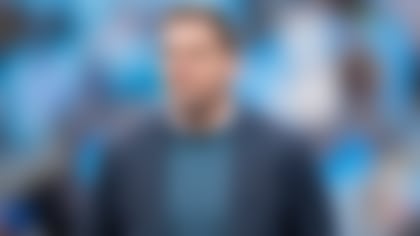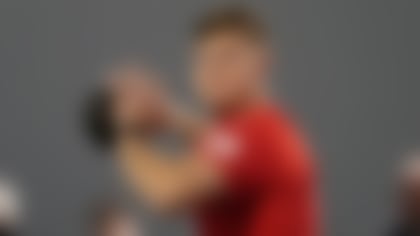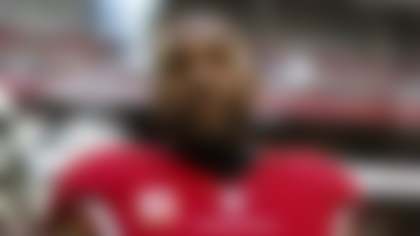"That's horse---- what we just put out there!"
The lowest moment in a Rams season stuffed with disappointment resulted in former offensive coordinator Rob Boras raging at halftime of a blowout loss to the Falcons, for NFL Films to capture in "All or Nothing" for posterity.
"Now let's find out what we're about these next 30 minutes!" Boras seethed. "Are we going to respond or we going to put our heads down and pout? Who's f------ pissed?"
Running back Todd Gurley was the only man to answer, issuing a stream of invectives to no one in particular that he was tired of the "sorry-ass offense week after week." After the game, Gurley told reporters the Rams looked like a "middle school offense" and players were "going through the motions." Head coach Jeff Fisher was fired the next day.
Changing identity in the NFL can happen that fast. The Rams sought a transformation when they moved to Los Angeles, but the dreary offense was all too familiar. Fisher's teams didn't finish in the top 20 in points, yards or efficiency (according to Football Outsiders) once during his five seasons at the helm.
Enter Sean McVay, the precocious choice to take over as Rams coach and construct a professional offense for Gurley to thrive in. McVay may as well have "Opposite of Jeff Fisher" tattooed on his forehead. From McVay's motormouth press conferences to his versatile offensive approach, the young coach provides a facelift for an organization that desperately needs it.
And the Rams aren't alone in undergoing an extreme makeover this offseason -- the Panthers and Colts are making major renovations of their own. For these three teams, it's the season for natural selection: Adapt or die.
Let's take a closer look at the changing identities of three NFL franchises:
Los Angeles Rams: Sean McVay is the anti-Jeff Fisher
The Rams are seeking stability while installing their fourth different offense in as many seasons. As Gurley recently put it, they can't get any worse.
Sean McVay's approach in Washington was deceptively simple: Flood the field with capable pass catchers and allow Kirk Cousins to distribute the ball like a point guard to the best mismatch. The Redskins' scheme was loaded with short, high-percentage throws, along with creative ways to get receivers open deep. Their vertical passing game was among the league's best despite Cousins not having a huge arm.
Last year's No. 1 overall pick, Jared Goff, has superior physical attributes to Cousins, but there's no telling whether Goff has the mental makeup to thrive as an NFL quarterback. McVay's hire was about giving Goff a fighting chance. Passing the football under Fisher was a reactive enterprise. The quarterback's job was to avoid losing, to be as aggressive as the score dictated, to wait for the overrated defense and running game to save the day. Fisher coached like he was running the 1985 Bears team he once played for.
These Rams don't have the personnel yet to dominate, but McVay allows them to modernize and be respectable. I witnessed Gurley being moved all around the formation during the team's June minicamp in an effort to unleash his receiving skills. Gurley joked recently to Sirius XM NFL Radio that he hoped the Rams offense would be more "Todd-friendly." Ironically, the key to that might be for the Rams to avoid being so Todd-centric. McVay won't send Gurley running into a brick wall on second-and-8.
Gurley's effusive praise of the team's new coaching staff could be interpreted through the lens of what last year's staff lacked, depending on your level of cynicism. Gurley has mentioned the staff's attention to detail, creating advantageous one-on-one matchups and evolving into situational masters.
McVay understands that the best offensive identity is to never stop evolving.
"We want to do a good job as coaches figuring out our players and then we'll adjust the system accordingly," McVay said in June. "We've got a lot of different things that we can do, but it's about figuring out what these guys do best. Having an identity and making sure that you have some complements off that identity."
Carolina Panthers: The plan to save Superman
Panthers coach Ron Rivera telegraphed the desire to evolve offensively well before the 2016 team stopped pounding. Rivera admitted last December his staff could no longer expose Cam Newton by running the zone read 20 times a game. My comrade Chris Wesseling adroitly suggested Ben Roethlisberger as a model for Cam's mid-career development in the pocket, and Rivera was apparently listening.
"There's a great example, and it's been written about and talked about. Look what they did out in Pittsburgh with Ben Roethlisberger," Rivera said Monday on Sirius XM NFL Radio. "Look what they did with the type of players they put in their backfield, the type of players they put in their receiving core. ... We looked at some of the other teams in the league and looked at some of the things they were doing, trying to figure out how we could incorporate those things into what we do right now."
Organizations say more with actions than interviews. General manager Dave Gettleman declared a statement of purpose by drafting Swiss Army Knife back Christian McCaffrey eighth overall in April, then doubling down with multi-talented speedster Curtis Samuel in the second round. Size for the sake of size -- embodied by wideouts Kelvin Benjamin and Devin Funchess -- represents the old way of thinking. Speed, versatility and creating easier throws for Newton -- that's the Panthers' blueprint for the future. The transition comes a year too late.
For proof, just dial up some 2016 Panthers pass plays on NFL Game Pass using the Coaches Film, allow Newton time to set up in the pocket, then hit pause and try to find an open receiver. (Note: This is a terrible game for anyone but masochistic Panthers fans.)
Relying on Cam's ability to complete low-percentage throws down the field was not a sustainable offensive strategy. His accuracy was too streaky, his receivers and offensive line not talented enough. Newton has the arm strength to throw the ball 60 yards off his back foot with a partially torn rotator cuff, but he shouldn't need to use that arm strength on every pass. For a team that prides itself on toughness, it was amazing to see how rarely Carolina won individual matchups up front or on the outside.
McCaffrey and Samuel can't fix the Panthers offense on their own. They can provide offensive coordinator Mike Shula more options for shorter routes, different formations and plays after the catch. Instead of relying on Newton to throw passes to power forwards like Benjamin who post up defenders before getting tackled right away, the receivers can do some of the work for Newton.
"A lot of the idea is to take the pressure off our quarterback, and take some of the hits off of him as well," Rivera said on Sirius XM.
The transition promises to be bumpy. Changing offensive identity without changing coaches is rare in the NFL, something only Bill Belichick and Tom Brady pull off with regularity. Just look at Pittsburgh's experience, where it took a season and a half for offensive coordinator Todd Haley and Big Ben's partnership to take off. Newton's shoulder surgery, previous struggles in the short passing game and the team's reconstituted offensive line only add to the degree of difficulty. Like Roethlisberger, however, Newton has the ability to pull it off.
Rivera should be lauded for his willingness to embrace a different approach. Learning from his failures, after all, is how he became Riverboat Ron in the first place.
Indianapolis Colts: New GM = New defense
Teams seeking a new identity can change course like the Panthers, change coaches like the Rams or find a new general manager ready to clean house. Colts owner Jim Irsay chose the latter approach, firing general manager Ryan Grigson in January and hiring former Chiefs director of football operations Chris Ballard.
Six months later, the straggling Colts defense is barely recognizable. The unit has 22 new players, with perhaps only 2-4 starters keeping their jobs. Grigson made a similar overhaul when he was hired in 2012, but didn't draft well after that or find defensive pieces with staying power. Ballard understood he couldn't fix an entire roster in one offseason, so he attacked a defensive unit that had slowly decayed under Grigson and coach Chuck Pagano's watch.
The defensive line, now led by free-agent addition Johnathan Hankins, is far deeper. The linebacker unit is likely to have four new starters following the additions of Jabaal Sheard, John Simon, Sean Spence, Jon Bostic and Barkevious Mingo.
"I will tell you we're different," Colts defensive coordinator Ted Monachino said via the team's website. "We're bigger. We're younger. We're stronger. We've got some guys that are more the rule than the exception around our league, where a year ago maybe we had a few more exceptions.
"We're big where we need to be in there. We're explosive where we need to be in there."
It's hard to overstate how aggressive Ballard was in remodeling the defense, a not-so-subtle rebuke of Pagano's five seasons of mediocre defensive results. Not only did Ballard sign six potential starters in free agency, he selected defensive players in each of the first five rounds of the draft. First-round safety Malik Hooker and second-round cornerback Quincy Wilson will get every chance to play right away.
While Pagano remains, many of his trusted former veterans are gone. It's Ballard's defense now, the vision of the front office being carried out. It's on Pagano to make it work with Ballard's players or the new boss will keep making changes next offseason.












